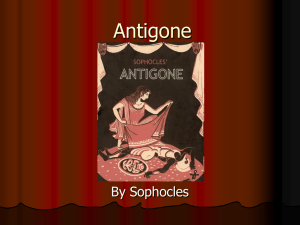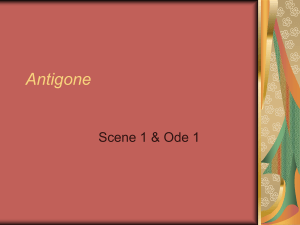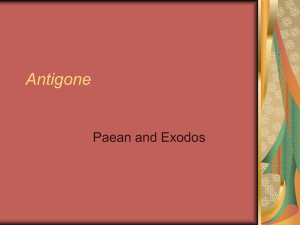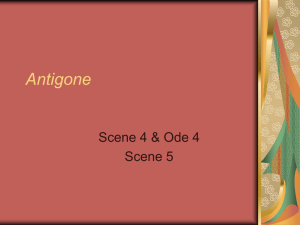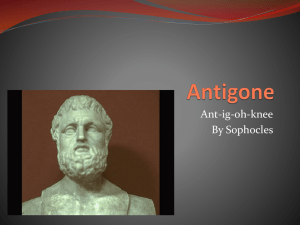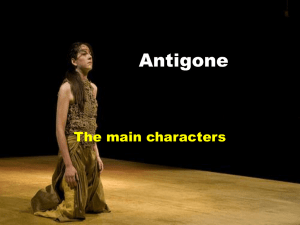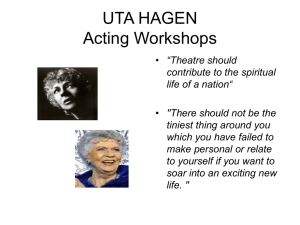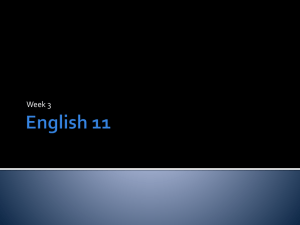PowerPoint - Missouri State University
advertisement
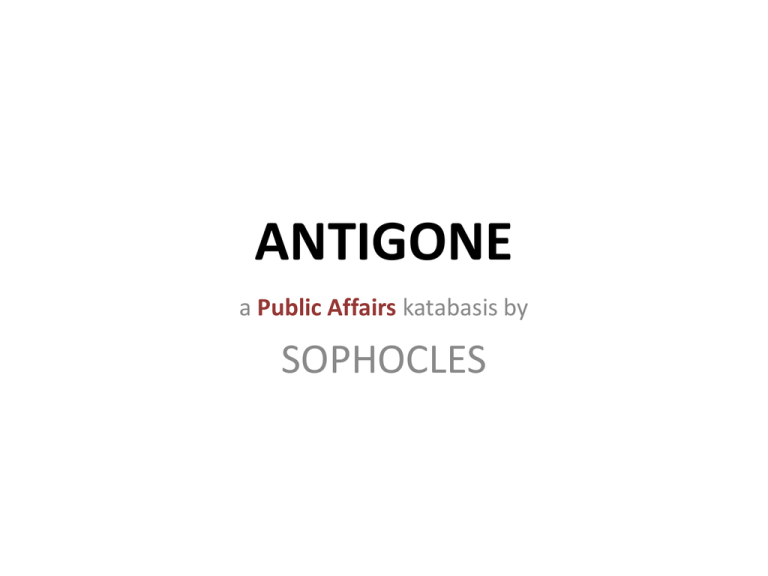
ANTIGONE a Public Affairs katabasis by SOPHOCLES SOPHOCLES The Greek tragedian Sophocles (497 BC-406 BC) is known to us. But he did more than just make people laugh. No less than Aristophanes, he considered himself a teacher (didaskalos) of his Athenian audiences, commenting upon and forcing them to think seriously about public affairs issues. In Antigone, Sophocles explores though the heroine’s character the essential quality of ethical leadership. TRAGEDY Tragedy is drama about human beings being forced to make life changing decisions based on incomplete information which they are bound to misinterpret anyway, seeing that they are only human beings equipped with human brains. All too often, these decisions involve two equally lousy choices. The ancient Greeks did not invent situations like this. They just found a dramatic form which handled them so well that everything that came afterward was a refinement. A TIGHT SPOT It’s an especially tight spot in Thebes, the city the ancient Greek deities loved to hate. Oedipus has just pok’d out his eyes and left town. In his absence, his sons Eteocles and Polynices agree to take turns being king in alternating years. Eteocles goes first, but decides he should keep being king. This provokes a civil war in Thebes. After the brothers successfully kill each other, Creon becomes king. Creon needs to ensure that this never happens to Thebes again! THEBAN CIVIL WAR Eteocles is supposedly the “good” brother. After Oedipus leaves Thebes, Eteocles and Polynices decided to alternate as king of Thebes on a yearly basis. Eteocles went first, but then reneged after his year was up. Therefore Polynices raised an army to drive Eteocles out of Thebes. The brothers killed each other in battle. Since Eteocles died defending Thebes, he receives honorable burial. Since Polynices died invading Thebes, his corpse is left to rot. Is this right? MODERN THEBES CREON Brother of Jocasta, brother-in-law and uncle of Oedipus, et cetera. He has already been interim king once, and was happy to pass the job to Oedipus. Now he is permanent king (once more against his wishes) and feels that he must lay down the law. The brave Eteocles, who died defending Thebes, is to be buried honorably. The body of the evil Polynices, who invaded Thebes, must be left to rot and be eaten by wild beasts. ANTIGONE Daughter of Oedipus and Jocasta, sister of the late Eteocles and the late Polynices, and of Ismene. As the fiancee of Creon’s son Haemon, she can look forward to a luxurious life as Queen of Thebes. She dissents from Creon’s decree forbidding the burial of Polynices because she believes there is a higher law dictating that she must ensure both of her brothers are properly buried. She sees it as a matter of justice and a family responsibility; her name Ἀντιγόνη means “worthy of her parents” in Ancient Greek. ISMENE Daughter of Oedipus and Jocasta, et cetera. Sister of the late Eteocles and the late Polynices, and of the individualist Antigone. She is not a go-getter like Antigone. She obeys Creon’s decree forbidding the burial of Polynices because 1) Creon is the king HAEMON Son of Creon and Eurydice. Cousin of Antigone and Ismene; engaged to marry Antigone. The plan is for them to have a long, happy reign as King and Queen of Thebes. Haemon is respectful of his father, but not uncritically so. He turns out to have a good sense of popular opinion in Thebes, and tries to mention this to Creon. He, too, is faced by an ethical dilemma. Father or fiancee? His name, Αἵμων, means “bloody” in Ancient Greek. KATABASIS This play is very much a katabasis story. Antigone’s liminal experience is not physical. Rather, it is more similar to Lucius’s dystopic experiences as an Ass in The Golden Ass. Once a pampered little princess, Antigone becomes a criminal from the moment she buries her brother Polynices. It literally ends with Antigone’s descent into the grave, from which she does not return. I would argue that Thebes itself experiences a katabasis, as the two wisdom figures Antigone and Creon duke it out over the concept of ethical leadership. Or perhaps it is Creon himself? Let’s talk about this some, ok? THE BIG QVESTION Is Antigone correct in her decision to bury the remains of the deceas’d Polynices regardless of the personal consequences? Is there a possibility that Creon’s actions are in fact every bit as justifiable as Antigone’s actions? Which of the two relatives does a better job of exemplifying ethical leadership in your opinion? ETHICS (simple version) The basic concepts and fundamental principles of decent human conduct. Ethics includes study of universal values such as the essential equality of all men and women, human or natural rights, obedience to the law of land, concern for health and safety and, increasingly, also for the natural environment. See also morality. ETHICS (complex version) First, ethics refers to well-founded standards of right and wrong that prescribe what humans ought to do, usually in terms of rights, obligations, benefits to society, fairness, or specific virtues. Ethics, for example, refers to those standards that impose the reasonable obligations to refrain from rape, stealing, murder, assault, slander, and fraud. Ethical standards also include those that enjoin virtues of honesty, compassion, and loyalty. And, ethical standards include standards relating to rights, such as the right to life, the right to freedom from injury, and the right to privacy. Such standards are adequate standards of ethics because they are supported by consistent and wellfounded reasons. ETHICS (complex version) Secondly, ethics refers to the study and development of one's ethical standards. As mentioned above, feelings, laws, and social norms can deviate from what is ethical. So it is necessary to constantly examine one's standards to ensure that they are reasonable and well-founded. Ethics also means, then, the continuous effort of studying our own moral beliefs and our moral conduct, and striving to ensure that we, and the institutions we help to shape, live up to standards that are reasonable and solidly-based. See more at: "What is Ethics?" at Santa Clara University ETHICAL LEADERSHIP Goal: Students will articulate their value systems, act ethically within the context of a democratic society and demonstrate engaged and principled leadership. (Adapted from the Center for Ethical Leadership) Missouri State is preparing students for the future by helping them understand the ethical dimensions of leadership and take what they learn in the classrooms and use it to help solve problems and bring about change. THE ETHICAL CITIZEN The concepts and practices of ethics and ethical citizenship have been elusive and contested notions throughout documented human history. The mere mention of the word “ethical” conjures a complicated web of questions and socio-cultural considerations. Additionally, many would argue that, in recent years, considerations of ethical citizenship have grown even more complicated, notably as our world has grown “smaller” and an eternally expanding roux of perspectives are being integrated into the pot of global communication. ETHICAL LEADERSHIP ANTIGONE: That’s what people say the noble Creon has announced to you and me—I mean to me— and now he’s coming to proclaim the fact, 40 to state it clearly to those who have not heard. For Creon this matter’s really serious. Anyone who acts against the order will be stoned to death before the city. Now you know, and you’ll quickly demonstrate whether you are nobly born, or else a girl unworthy of her splendid ancestors. ETHICAL LEADERSHIP ISMENE: Think how we’ll die far worse than all the rest, if we defy the law and move against the king’s decree, against his royal power. We must remember that by birth we’re women, and, as such, we shouldn’t fight with men. Since those who rule are much more powerful, we must obey in this and in events which bring us even harsher agonies. So I’ll ask those underground for pardon— since I’m being compelled, I will obey those in control. That’s what I’m forced to do. It makes no sense to try to do too much. [60] 80 ETHICAL LEADERSHIP CREON: For me, a man who rules the entire state and does not take the best advice there is, but through fear keeps his mouth forever shut, such a man is the very worst of men— and always will be. And a man who thinks more highly of a friend than of his country, well, he means nothing to me. Let Zeus know, the god who always watches everything, I would not stay silent if I saw disaster moving here against the citizens… [180] 210 ETHICAL LEADERSHIP CHORUS: The qualities of his inventive skills bring arts beyond his dreams and lead him on, sometimes to evil and sometimes to good. If he treats his country’s laws with due respect and honours justice by swearing on the gods, he wins high honours in his city. 420 But when he grows bold and turns to evil, [370] then he has no city. A man like that— let him not share my home or know my mind. CULTURAL COMPETENCE ANTIGONE: Yes. Zeus did not announce those laws to me. And Justice living with the gods below sent no such laws for men. I did not think anything which you proclaimed strong enough to let a mortal override the gods and their unwritten and unchanging laws. They’re not just for today or yesterday, but exist forever, and no one knows where they first appeared. So I did not mean to let a fear of any human will lead to my punishment among the gods. [450] 510 CULTURAL COMPETENCE Goal: Students will recognize and respect multiple perspectives and cultures. Missouri State helps students develop cultural knowledge in several ways. Study abroad programs, interactions with international students and opportunities to study different languages, histories and religions, help students broaden their horizons, build relationships and bring about better competition for the future. CULTURAL COMPETENCE CREON: This girl here was already very insolent in contravening laws we had proclaimed. Here she again displays her proud contempt— having done the act, she now boasts of it. She laughs at what she’s done. Well, in this case, if she gets her way and goes unpunished, then she’s the man here, not me. No. She may be my sister’s child, closer to me by blood than anyone belonging to my house who worships Zeus Herkeios in my home, but she’ll not escape my harshest punishment— [480] 550 CULTURAL COMPETENCE CHORUS: Hope ranging far and wide brings comfort to many men—but then hope can deceive, delusions born of volatile desire. It comes upon the man who’s ignorant until his foot is seared in burning fire. Someone’s wisdom has revealed to us this famous saying—sometimes the gods lure a man’s mind forward to disaster, and he thinks evil’s something good. But then he lives only the briefest time free of catastrophe. 700 [620] CIVIC ENGAGEMENT Goal: Students will recognize the importance of contributing their knowledge and experiences to their own community and the broader society. Goal: Students will recognize the importance of scientific principles in the generation of sound public policy. Community engagement lets students branch out and see how the world is working through a different lens, giving them the opportunity to work with their communities and build up their ability to lead in their careers. CIVIC ENGAGEMENT HAEMON: Your gaze makes citizens afraid—they can’t say anything you would not like to hear. But in the darkness I can hear them talk— the city is upset about the girl. They say of all women here she least deserves the worst of deaths for her most glorious act. When in the slaughter her own brother died, she did not just leave him there unburied, to be ripped apart by carrion dogs or birds. Surely she deserves some golden honour? That’s the dark secret rumour people speak. [690] 790 CIVIC ENGAGEMENT CHORUS LEADER My lord, if what he’s said is relevant, it seems appropriate to learn from him, and you too, Haemon, listen to the king. The things which you both said were excellent. 820 CREON And men my age—are we then going to school to learn what’s wise from men as young as him? HAEMON There’s nothing wrong in that. And if I’m young, don’t think about my age—look at what I do. PLAUSIBLE DENIABILITY CREON: I’ll take her on a path no people use, and hide her in a cavern in the rocks, while still alive. I’ll set out provisions, as much as piety requires, to make sure the city is not totally corrupted. Then she can speak her prayers to Hades, the only god she worships, for success avoiding death—or else, at least, she’ll learn, although too late, how it’s a waste of time to work to honour those whom Hades holds. 890 DRAMA PRINCESS? CHORUS To be piously devout shows reverence, but powerful men, who in their persons incorporate authority, cannot bear anyone to break their rules. Hence, you die because of your own selfish will. ANTIGONE Without lament, without a friend, and with no marriage song, I’m being led in this miserable state, along my final road. So wretched that I no longer have the right to look upon the sun, that sacred eye. 980 [880] DRAMA PRINCESS? ANTIGONE In my wretchedness, why should I still look up to the gods? Which one can I invoke to bring me help, when for my reverence they charge me with impiety? Well, then, if this is something fine among the gods, I’ll come to recognize that I’ve done wrong. But if these people here are being unjust may they endure no greater punishment… CHORUS LEADER The same storm blasts continue to attack the mind in this young girl. 1040 ARTI MANTHANO MESSENGER …The lucky and unlucky rise or fall by chance day after day—and how these things are fixed for men no one can prophesy. [1160] For Creon, in my view, was once a man we all looked up to. For he saved the state, this land of Cadmus, from its enemies. He took control and reigned as its sole king— and prospered with the birth of noble children. Now all is gone. For when a man has lost what gives him pleasure, I don’t include him among the living—he’s a breathing corpse. 1290 ARTI MANTHANO MESSENGER …Creon saw him, let out a fearful groan, then went inside and called out anxiously, "You unhappy boy, what have you done? What are you thinking? Have you lost your mind? Come out, my child—I’m begging you—please come." But the boy just stared at him with savage eyes, spat in his face and, without saying a word, drew his two-edged sword. Creon moved away, Angry at himself, the ill-fated lad right then and there leaned into his own sword, driving half the blade between his ribs. 1370 [1230] ARTI MANTHANO CREON I killed you, my son, without intending to, and you, as well, my wife. How useless I am now. I don’t know where to look or find support. Everything I touch goes wrong, and on my head fate climbs up with its overwhelming load. CHORUS The most important part of true success is wisdom—not to act impiously towards the gods, for boasts of arrogant men bring on great blows of punishment— so in old age men can discover wisdom. [1340] 1490 [1350]
